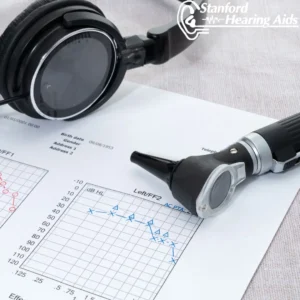Understand How Dehydration Affects Hearing
Our bodies are incredible machines that rely on proper maintenance to function at their best. Staying hydrated is essential for overall health, including hearing health. Water comprises about 60% of our body weight and supports numerous vital functions. So dehydration and hearing loss is a valid concern.
Think of water as the oil that keeps your body’s engine running smoothly. It:
- Regulates body temperature through sweating.
- Lubricates joints, reducing friction.
- Delivers essential nutrients to cells.
- Aids digestion and keeps the digestive system moving smoothly.
- Flushes toxins through sweat and urine.
When dehydration occurs, it disrupts the body’s delicate balance, potentially leading to various issues, including fatigue, headaches, dizziness, muscle cramps, and even kidney stones in severe cases. Dehydration can also impact your hearing. Let’s explore how.
How Hydration Affects Your Ears
Dehydration can indeed affect your ears. The inner ear, filled with fluid, is crucial for hearing and balance. Dehydration disrupts the fluid balance in the inner ear, leading to:
- Ringing in the Ears (Tinnitus): Dehydration can cause a ringing, buzzing, or hissing sound in your ears. This condition is known as tinnitus and can be pretty bothersome.
- Loss of Balance: The fluid in your inner ear helps maintain balance. Dehydration can reduce this fluid, leading to dizziness or loss of balance.
- Dizziness: Alongside balance issues, dehydration can make you feel lightheaded or dizzy.
- Muffled Hearing: Dehydration affects the cochlea, a fluid-filled chamber in the inner ear that transmits sound vibrations to tiny hair cells. These hair cells convert the vibrations into electrical signals for the brain. Reduced fluid levels impair this process, potentially causing muffled hearing.
- Feeling of Fullness: Dehydration can cause a sensation of fullness or pressure in the ears, similar to what you might feel during changes in altitude.
This disruption occurs because the cochlea relies on a delicate balance of fluids and electrolytes to function correctly. When you’re dehydrated, your body’s overall fluid level dips, which can impact the inner ear’s fluid balance, leading to these symptoms.
Understand more about the early symptoms of hearing loss in adults.
Can Dehydration Cause Muffled Hearing?
Yes, dehydration can cause muffled hearing. The reduced fluid in the inner ear affects sound transmission, leading to a muffled sensation. However, this effect varies among individuals. Rehydration can quickly alleviate the issue for some, while others may need to consult a hearing professional for persistent problems.

Does Drinking Water Help Tinnitus?
Tinnitus, a condition where individuals hear phantom noises like ringing, can be affected by hydration levels. Proper hydration may help reduce tinnitus symptoms for some individuals by maintaining fluid balance in the inner ear and supporting overall health. Drinking water can also support the immune system, reducing the likelihood of infections that could worsen tinnitus.
Dehydration and Sudden Hearing Loss: Emerging Research
Sudden Sensorineural Hearing Loss (SSNHL) is a rapid decline in hearing ability, often accompanied by ear fullness or pressure. Recent research suggests a potential link between dehydration and SSNHL. Dehydration might increase inner ear stress or inflammation, contributing to SSNHL. Early diagnosis and treatment are crucial for recovering hearing after SSNHL.
Practical Tips for Avoiding Dehydration and Hearing Loss
Maintaining proper hydration is vital for overall health and hearing. Here are some tips to stay hydrated:
- Drink Water Regularly: Aim for at least eight 8-ounce glasses of water daily.
- Listen to Your Body: Drink water before you feel thirsty.
- Carry a Reusable Water Bottle: Keep it filled and sip throughout the day.
- Add Flavor: Add lemon, cucumber, or other fruits to your water for a refreshing twist.
- Eat Water-Rich Foods: Include fruits and vegetables like watermelon, cucumber, and spinach in your diet.

When to Consult a Hearing Professional
If you experience persistent hearing issues, seek professional help. Consult a hearing professional for:
- Persistent muffled hearing
- Sudden hearing loss
- Chronic tinnitus
- Balance problems
Hearing professionals offer hearing evaluations, diagnosis, treatment options, and hearing aid fitting. Early intervention is crucial for managing hearing loss and improving overall hearing health.
Learn more about how to find a hearing specialist near me.
Contact Stanford Hearing for Expert Care
For expert advice and personalized care, schedule an appointment with Stanford Hearing today. Take charge of your hearing health and enjoy the beautiful sounds around you.
Stay hydrated, stay healthy, and hear better!
